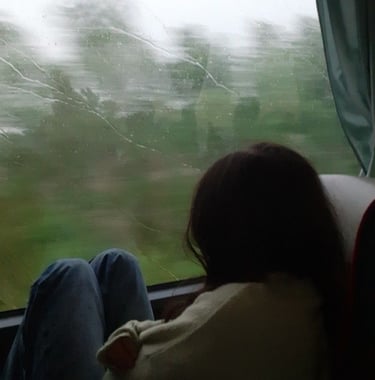The Battle Between Summer and Winter
By Evie May Simpson
LIFESTYLE
Edited by Charlotte W
9/25/20252 min read


The familiar feeling of the harsh winter breeze hits your face as you step out the door. Dark circles nest beneath hollow eyes—once filled with light, now shadowed by a cloud of darkness. A path is made through the clothes scattered across the bedroom floor. The dying flowers on the bedside table yearn for a ray of light. The locked bathroom door becomes your refuge, as foreign tears stream down adolescent cheeks. You sit at the back of the classroom, cradling a heavy head, desperate for just a moment to close your eyes. A piece of paper is thrown onto your desk, followed by a pitiful look from the teacher—a persistent reminder that you will always feel like a failure. Locked away in a dark room, cowering beneath the sheets, you try to shut out all the voices.
I always felt this sadness eating away at me. It would hit at the strangest of moments—walking home after a long day, out with friends, or late at night when everyone was asleep. I’d swallow that feeling of utter despair and loneliness, plastering on a smile to cover glassy eyes. After the darkness came the rain—again and again. Behind closed doors, raindrops reflected on my cheeks and cascaded down a pallid face. I found myself wrapped in the comforting arms of my nightly routine. Staring up at the ceiling, I’d ask myself once again: What is wrong with me?
Nowadays, we tend to give everything and everyone a label. In this case, it’s necessary. Seasonal depression is real. It grows like a vine—tendrils creeping slowly through the end of summer, stretching into winter until it is all-encompassing, all-consuming, until it suffocates. It is a mental illness, not a trend. In the UK alone, over two million people suffer from Seasonal Affective Disorder. It is significantly more common in teenagers due to various contributing factors: academic pressure, hormonal transitions, troubled home lives or relationships. It can feel like a disease—and it kills like one.
So, reach out to your loved ones. Smile at that stranger in the street. Ask someone how they are. Knowing someone is there for you can stop a person from falling into a turmoil of darkness.
Be the ray of sunlight that brings the flowers back to life.
For more, explore fashion, travel, and lifestyle insights here.
Subscribe to our newsletter!
info@femmine.co.uk
